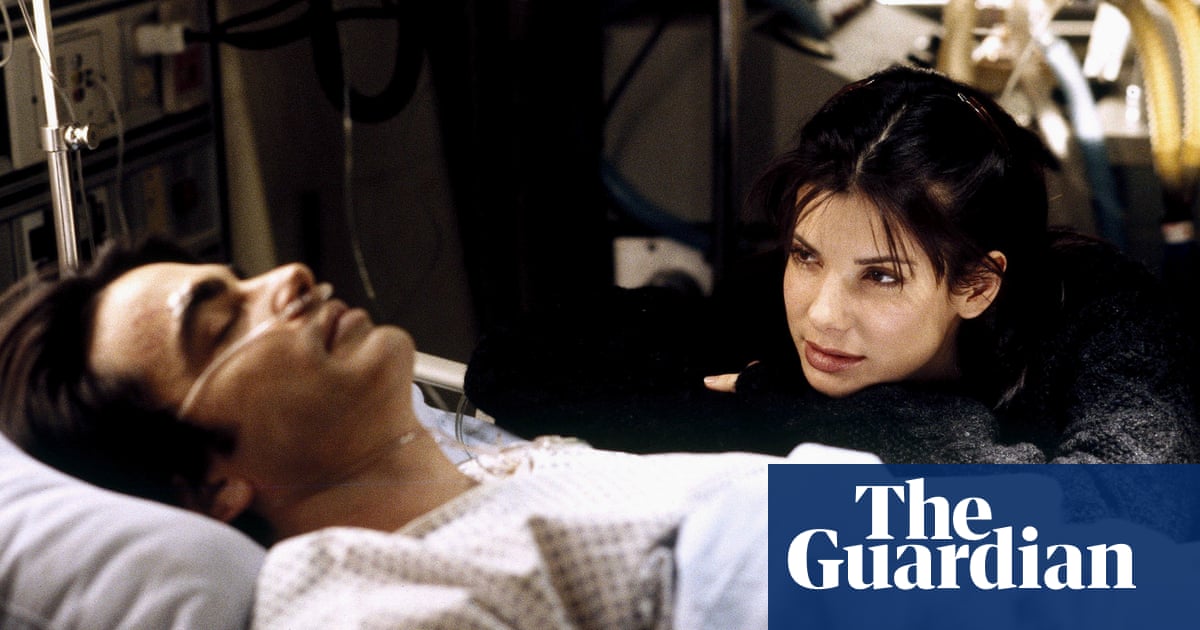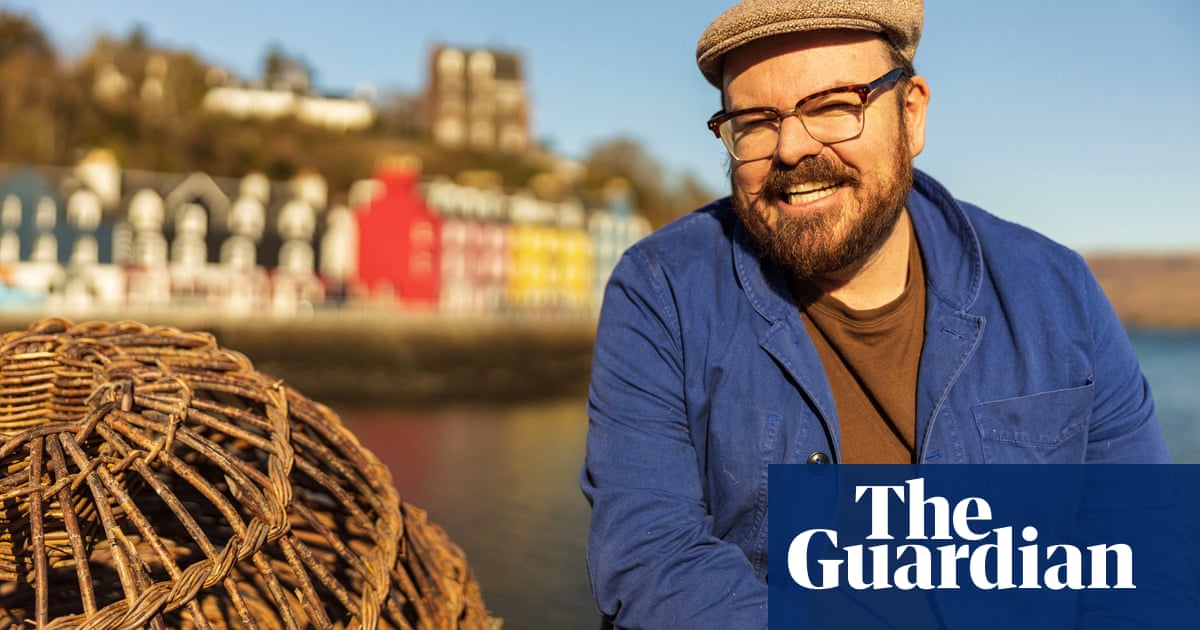
At the top of the stairs in his Los Angeles home, a portrait of Nicholas Hoult in military regalia hangs on the wall. “That’s very, very normal,” the actor deadpans, before breaking into a laugh. Gladly it isn’t some kind of big-headed shrine to himself, but rather a prop he took from the set of The Great, the gory and garish TV show in which he stars as the Russian emperor Peter III. His co-star Elle Fanning giggles as she admits pinching a sculpture of herself made of butter (“I receive a lifesize version in the show, but I just took the little one”). In fact, as they recall other decorations – a baby’s teddy bear said to be “made from a real bear”, and the mummified remains of Hoult’s onscreen mother, wheeled around in a glass case – the portrait and sculpture start to sound normal, even mundane, by comparison.
Created by Tony McNamara – co-writer of the Oscar-winning film The Favourite – The Great isn’t your average period drama. A racy, raucous and not-at-all historically accurate comedy-drama shot through with feminist revisionism, it tweaks and embellishes the story of how Catherine the Great (Fanning) overthrew Hoult’s Peter to become Russia’s longest serving female leader. Hoult, 31, was cast after nailing the “flamboyant, cruel egotist in a wig” role of the Earl of Oxford in The Favourite. Meanwhile, Hollywood star Fanning is perfectly cast as Catherine, appearing much older than her 23 years, but always with an air of youthful mischief.
Initially released on streaming service StarzPlay in the UK, its first season aired weekly on Channel 4 in early 2021. It hit audiences like a shot of vodka to the throat, with wild party scenes, grisly fights and a punchy script packed with waggish one-liners (“women are for seeding, not reading”). Having already received acclaim – and two Emmy nominations – in the US, it quickly became a word-of-mouth hit across the Atlantic.
The plot also proved compelling. Season one saw the dazzlingly intelligent, progressive Catherine leave Germany for Russia, finding herself utterly repulsed by the casually violent yet pitifully dim Peter. Unperturbed, she tried to fulfil her duties, even keeping her cool when her new love served the head of a Swedish soldier on a silver platter for dinner. Soon – not long after Peter’s failed attempt to drown her – Catherine resolved to transform Russia by taking over as empress, forming a motley crew to stage a coup. There was just one more problem: she was pregnant. When Peter captured her lover, however, Catherine was further fuelled by rage, and the gunshot signal was fired.
The second season picks up four months later, with the civil war at a standstill. As bored children kick a decapitated head around as entertainment, it’s clear that not much has changed. Peter eventually abdicates because … well, he’s very hungry. “I bait him out of hiding with roasted food,” explains Fanning. “It’s really easy – he’s a simple, simple man.” And just like that, Catherine has the power she so badly wanted: “Now what are you going to do with it? Are you even going to be a good leader? That’s something she’s grappling with – becoming a mother both to Russia and to her own child.”
Convinced that this is a temporary state of affairs, and excited about becoming a father, Peter willingly becomes Catherine’s prisoner in his rooms, where she also uses him as her willing sexual servant. “[He] still believes himself to have wonderful plans in the works,” Hoult explains. “But also, he’s just falling more and more in love with Catherine each time he sees her strategicness, ruthlessness and ability to be his match.” As the series progresses, however, Catherine’s enlightened ideas – female education, freeing the serfs, ending civil bloodshed – prove too radical for the court, which very much misses the good old days of death and debauchery.
The empress spends much of this season attempting to usurp her husband’s popularity and proving she can be a hoot. “Elle decided she needed Catherine to do something crazy that she’d regret in the morning, to show that her character had ‘lost herself’ at the party,” says Hoult. “She had this idea of serving macarons off her pregnant stomach while walking around in a bridge pose.” Taking pride in her party trick, Fanning says she pitched it four times to the director and writers. “I gave a show-and-tell to a lot of people. Everyone wanted to see it, and each time I’d go: ‘Oh god, I’ve gotta get down again.’”
Elsewhere, the prosthetic pregnancy bump provides other absurdly enjoyable moments, including scenes where a frog is placed on Catherine’s belly to bring good luck (its eventual death is a sign the baby is about to be born). “He would come in and be very calm in the beginning,” says Fanning of the animal. A couple of months into filming, however, it was mating season for their amphibious co-star, who fitted right in at the highly sexed court: “I couldn’t look into his eyes – he was a horny little frog freaking me out and jumping around. He was far too excited.”
Amid all the chaos and shifting power dynamics in Peter’s playground, Catherine receives a visit from her mother Joanna (Gillian Anderson). As the cast only receive two scripts at a time while filming, Fanning reveals there were lots of whispers about who would take the role – real court gossip. Then Anderson arrived on set, having just played Margaret Thatcher in The Crown. “You could tell that she has a similar sense of humour, watches the show and wants to be a part of it,” says Fanning. “She adds a new freshness and flavour to the series, and she brings out a side of Catherine that we hadn’t seen before.” As well as establishing herself as the stern matriarch who turns Catherine from a ballsy empress to an obedient child, Anderson embraces the fun of the series, taking on a very silly storyline that provides some of the biggest laughs. Not one to be outdone, Peter also boasts a celebrity dad – Jason Isaacs – in a short but standout scene that explains why he ended up the way he is.
The arrival of both parents is significant, as Catherine and Peter spend the season preparing to welcome baby Paul (“That was the real name of their first born!” Fanning laughs. “We do play with history, but that time it was totally true. Paul – it’s too good that it can’t be made up.”) The imminent birth even brings out a new side of Peter, one that almost makes you warm to him. Referring to the aforementioned “real” teddy bear, Hoult explains that Peter is “not good at showing it, but he does really try and love Paul. It is an endearing thing, him wanting to be a dad.”
Aside from this new paternal side, the only attribute of Peter’s that Hoult relates to is his love of food: “I love his foodie nature and how passionate he is about it. That’s his biggest weakness in some ways – it’s [why] the empire is handed over.” Fanning, on the other hand, reels off a list of Catherine’s qualities that she admires: “I’m protective of her feistiness and arrogance, which we see a little more of this season. I love that she’s very opinionated and unafraid; she talks a lot and puts her foot in her mouth.”
But, despite this admiration and some purloined props, they are far from their characters; two people who feel they are entitled – destined, even – to rule a country. Much of the show’s joy is in watching the pair take vicious swipes at each other both verbally (“I look at you and I dry like sand,” Catherine tells Peter) and physically (combat with sharp knives is a normal pastime) to get what they want. The writing also runs counter to the patriarchal oppression of the time, with the story told through the female gaze (much like some of its counterparts, such as Outlander and The Crown). But The Great is unafraid to go even further, poking fun at its betters as Catherine adopts Peter’s dastardly traits while also causing him harm.
Unlike her husband, Catherine isn’t a sadist – but she certainly isn’t perfect. Indeed, her shell hardening while Peter’s softens during the smallpox outbreak in season one is perhaps a reminder of the vital contrast between these leaders – and indicative of how they would handle, say, a pandemic. “Catherine would be developing a vaccine,” says Fanning. “She would be keeping everyone safe and taking it very seriously.” As for Peter, they’re both certain that he would continue as normal with orgies and parties: “He’s a super-spreader.”












